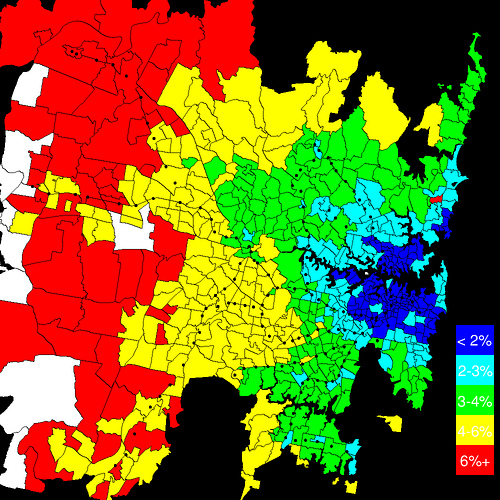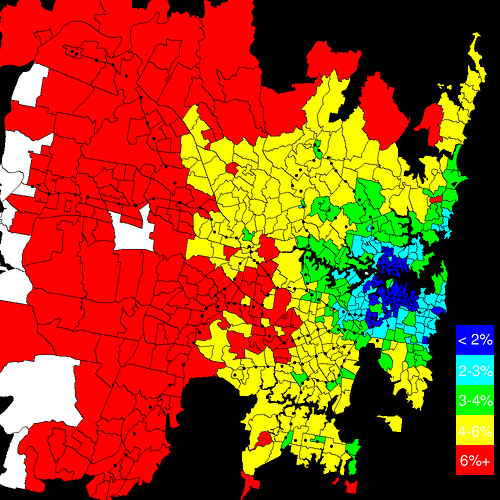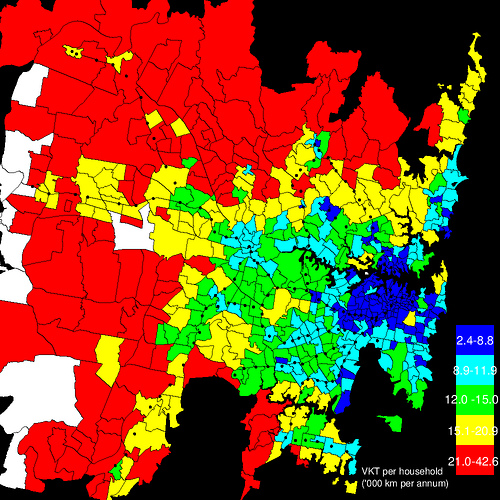The Impact Of Rising Oil Prices On Sydney Suburbs
Posted by Big Gav in oil price, sensitivity, sydney
Today's SMH has a prominent article on the impact of rising petrol prices on Sydney suburbs featuring a study by Peter Rickwood of UTS (one of Garry Glazebrook's students (pdf) by the look of it). ASPO Australia's David Bell gets a mention too.
There are some good graphics accompanying the article which show the sensitivity to petrol prices (in terms of proportion of gross income) across the metropolitan area under 2 scenarios - $1.50 a litre petrol and $2.00 a litre petrol. Under the second scenario most of western Sydney will be devoting more than 6% of their income to fuel consumption.
The results look somewhat similar to the charts in the Griffith University report on Oil Vulnerability in Australian Cities from a couple of years ago.

Image 1 - % of household income at $1.50 per litre
A related colour article looks at the impact of fuel prices and lack of public transport on one western Sydney family - though their refusal to share vehicles and large petrol guzzling cars do soften the impact a bit...
SOARING fuel prices are carving into the budgets of car-dependent households in western Sydney, exacerbating problems of insufficient public transport options and long distances to workplaces. Families in the west are driving up to 20 times the distance of those in the eastern suburbs, inner west and Lower North Shore, according to research by a PhD student at the University of Technology, Sydney, Peter Rickwood.
With fuel prices at about $1.50 a litre, households in the city's outer western ring - many of which are struggling with mortgage repayments - are sacrificing more than 6 per cent of their gross household income on petrol, Mr Rickwood's research shows. Households in the inner city are using less than 2 per cent of their incomes on fuel. With fuel prices continuing to climb, the dire situation is likely to spread further east.
If it reaches $2 a litre, as some predict could happen within the next two years, households near Parramatta and Bankstown could be using more than 6 per cent of their income on fuel. "This should send very significant alarm bells through government," said the president of the NRMA, Alan Evans. "Because there is no end in sight for seeing a downturn in the price of petrol and therefore the research would show that we have a serious crisis developing for the mortgage-belt families."
His concern was echoed by the president of the Western Sydney Regional Organisation of Councils, Tony Hay. "This is further substantial proof of the inequitable divide which reinforces the tale of two cities. Those of us [who are] car dependent are taking a huge burden for consumption of petroleum and the component of fuel excise," he said.
As rising fuel prices began to put the squeeze on family budgets, everything from doing volunteer work to driving to children's weekend sporting events could be affected, he said. "All the activities that make us a community, not just an economy, have the potential to be severely impacted."
Mr Rickwood's research combines data from the Department of Transport's annual survey of 3000 Sydney residents with demographic information from the census. He said the actual effect of fuel prices on households could be much greater in some cases than the averages shown in his research, especially if cars consumed more than nine litres of petrol per 100 kilometres.
Mr Evans said it was deeply concerning that there was no short-term remedy in sight. "The neglect of public transport over the years is now highlighting the problem. Clearly it shows the failure to build a public transport network is now coming back to bite people." He urged the federal and state governments to expand public transport into the western suburbs and urgently fund research into alternative fuels.
The Sydney co-ordinator of the Australian Association for the Study of Peak Oil and Gas, David Bell, said it was likely fuel would climb to $1.60 a litre in the coming months. "Within two years time I would say we would be getting close to $2 [a litre]. Since we've begun peaking, no one has any current history as to where petrol prices may go in the future."

Image 2 - % of household income at $2.00 per litre

Image 3 - Vehicle kilometres (1000) travelled annually





